International School on INtegrated Environmental Studies in the Arctic (INES)
with respect to climate changes
INES plan of fall webinars 2020, 28 September – 2 October 2020
As we decided to postpone the in-person school till the second half of February 2021 we decided to provide you with an online school during the planned school for 2020. We will prepare a number of open webinars for you.
We hope that this online edition International School on INtegrated Environmental Studies in the Arctic (INES) with respect to climate changes, as online seminars, will provide an interdisciplinary platform for discussions of these challenging issues. We also hope that our webinars will facilitate the exchange of information among users from different parts of the world, who care about our environment and Arctic itself.
Recorded materials will be available on the website a little later than we expected. At the moment, we invite you to watch the recorded webinars after prior registration.
To do this, write to: pakszys@iopan.pl in order to obtain a direct link to the materials.
Thanks for being with us!
INES plan of fall webinars 2020
(Files to download at the end of this page)
28 September 2020
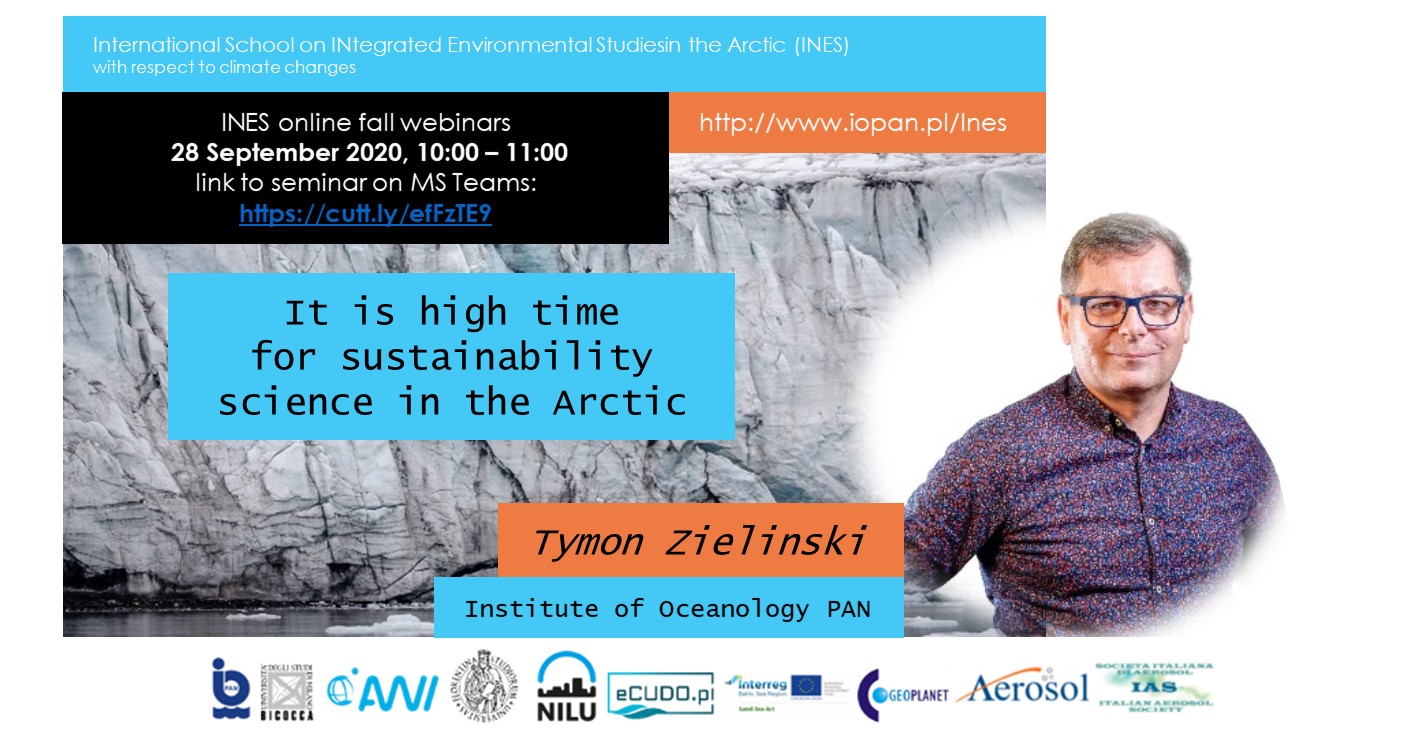
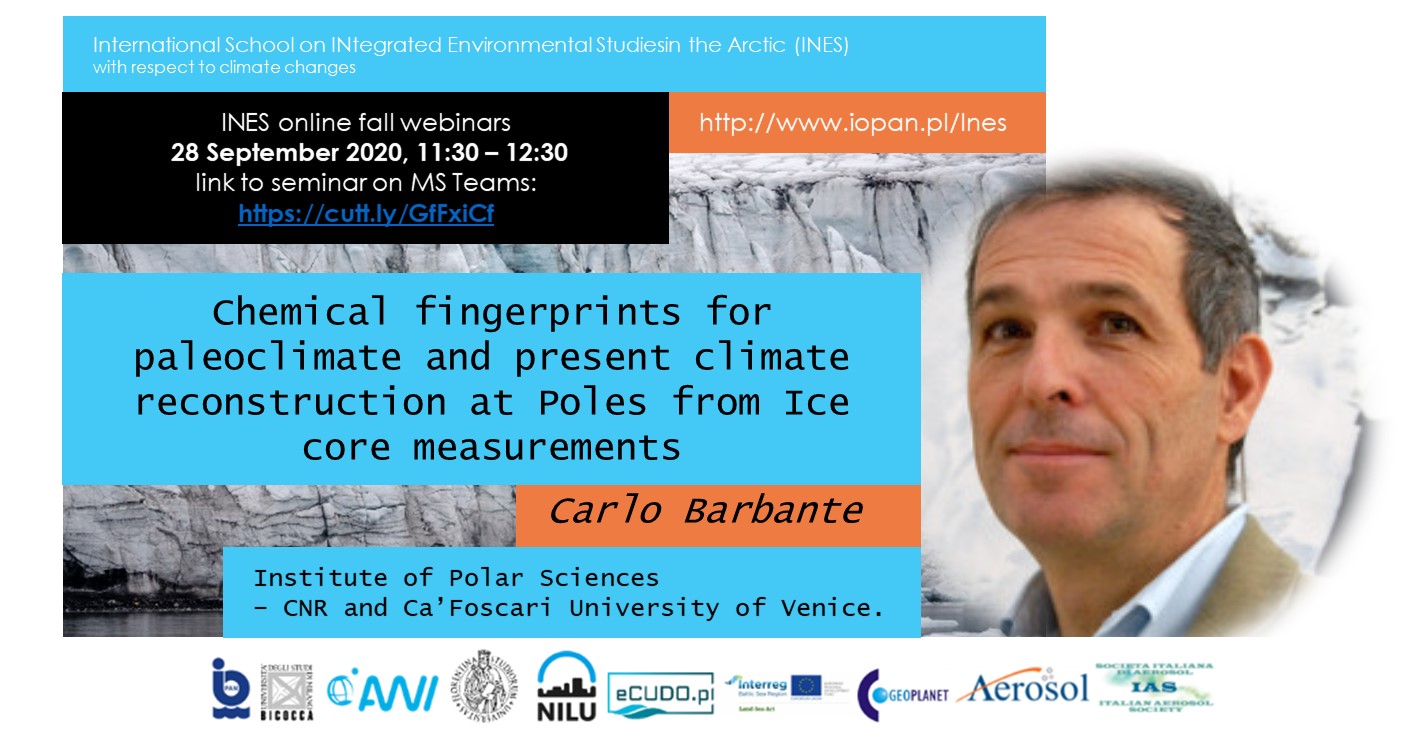 1. It is high time for sustainability science in the Arctic by Tymon Zieliński; Institute of Oceanology PAN. link: https://cutt.ly/efFzTE9
1. It is high time for sustainability science in the Arctic by Tymon Zieliński; Institute of Oceanology PAN. link: https://cutt.ly/efFzTE9
2. Chemical fingerprints for paleoclimate and present climate reconstruction at Poles from Ice core measurements by CarloBarbante; Institute of Polar Sciences – CNR and Ca’Foscari University of Venice. https://cutt.ly/GfFxiCf
29 September 2020
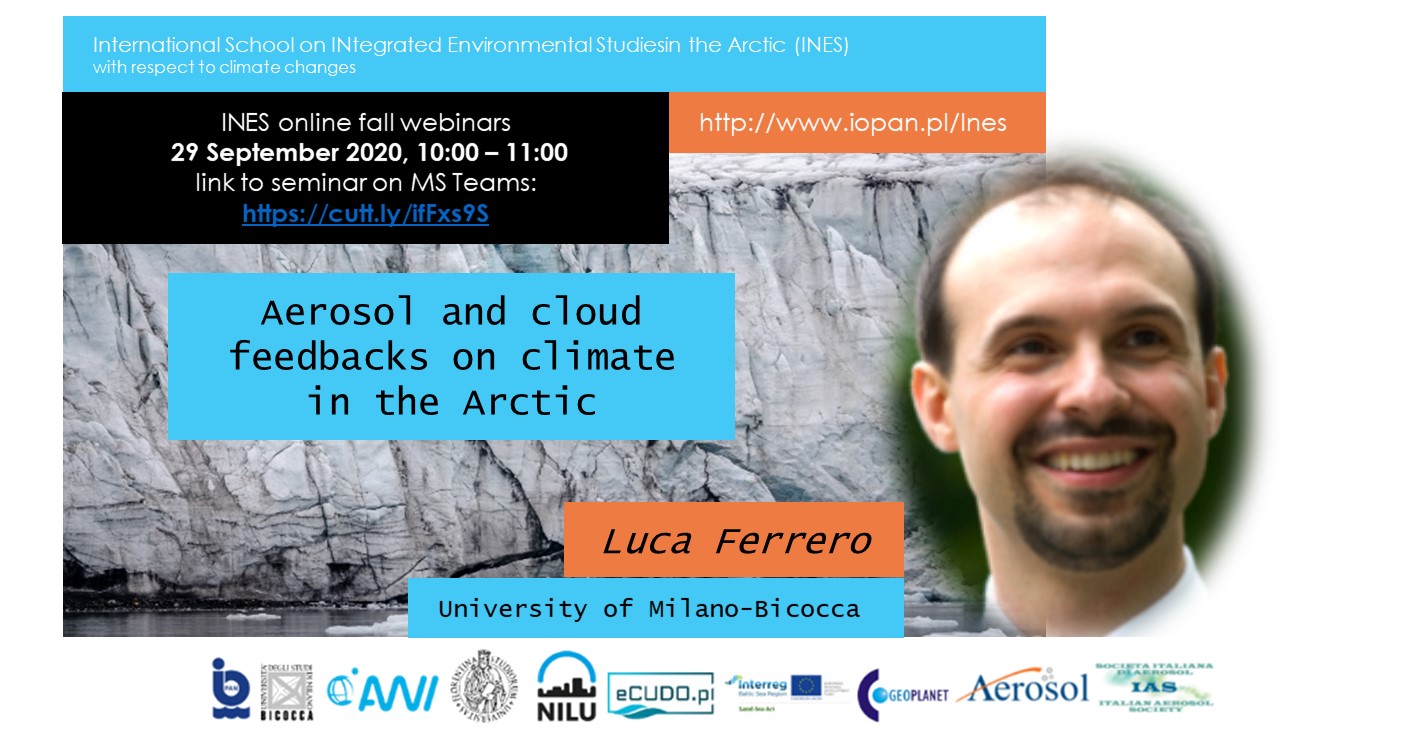
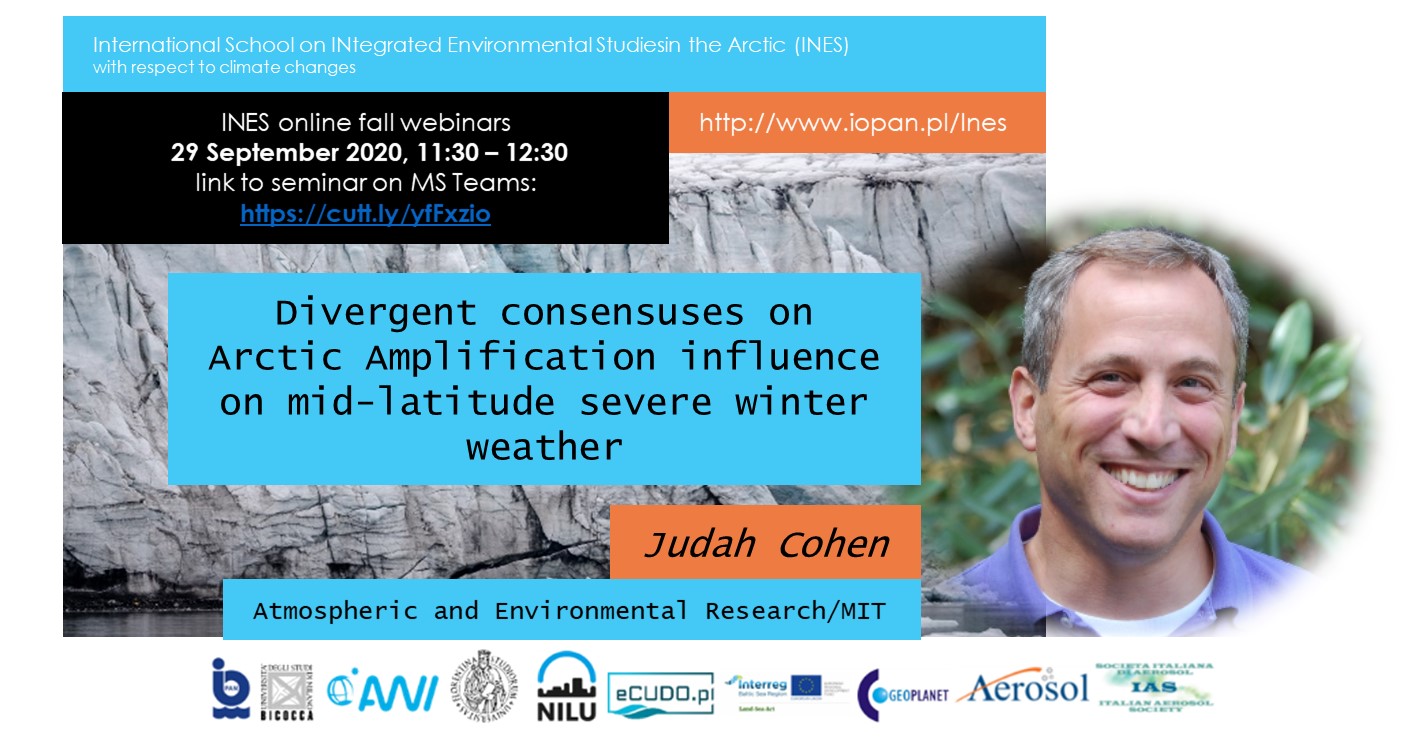 3. Aerosol and cloud feedbacks on climate in the Arctic by Luca Ferrero; University of Milano-Bicocca. https://cutt.ly/ifFxs9S
3. Aerosol and cloud feedbacks on climate in the Arctic by Luca Ferrero; University of Milano-Bicocca. https://cutt.ly/ifFxs9S
4. Divergent consensuses on Arctic Amplification influence on mid-latitude severe winter weather by Judah Cohen; Atmospheric and Environmental Research/MIT. https://cutt.ly/yfFxzio
30 September 2020
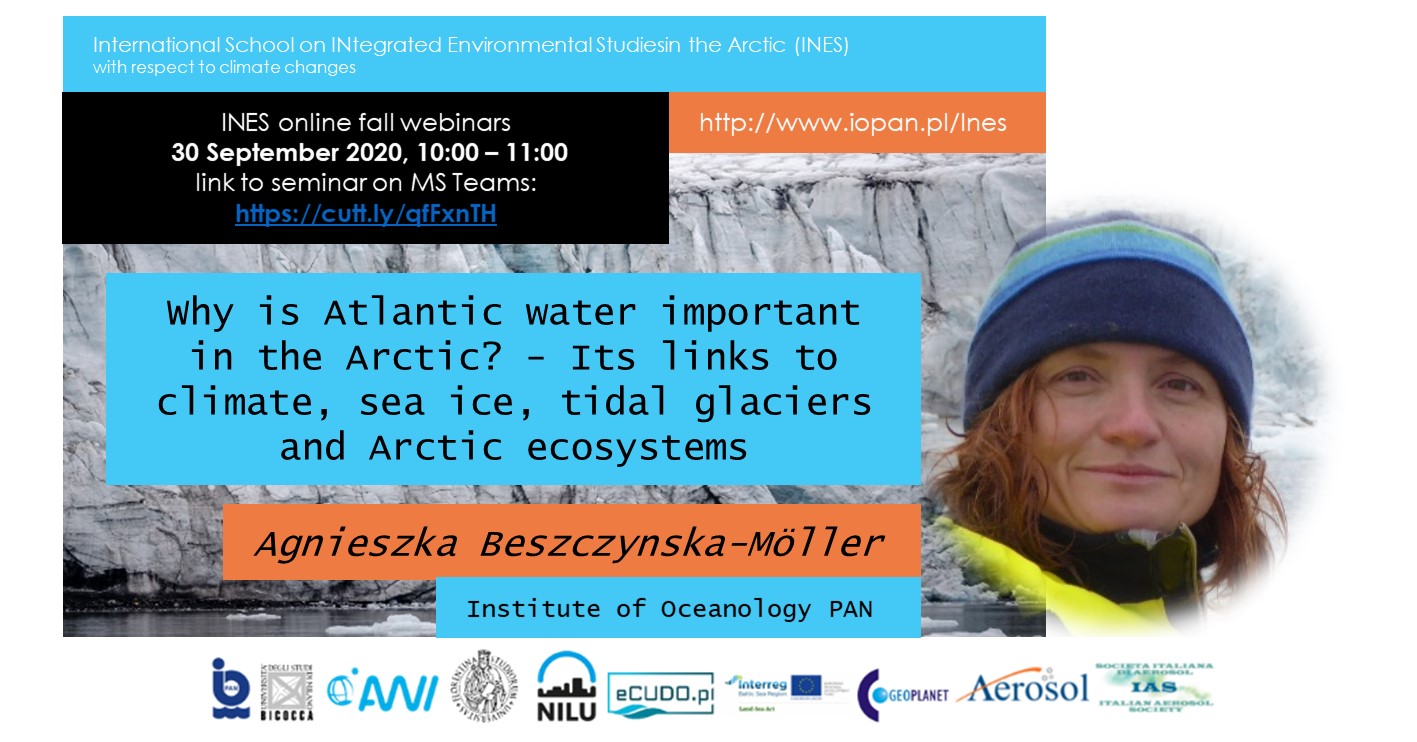
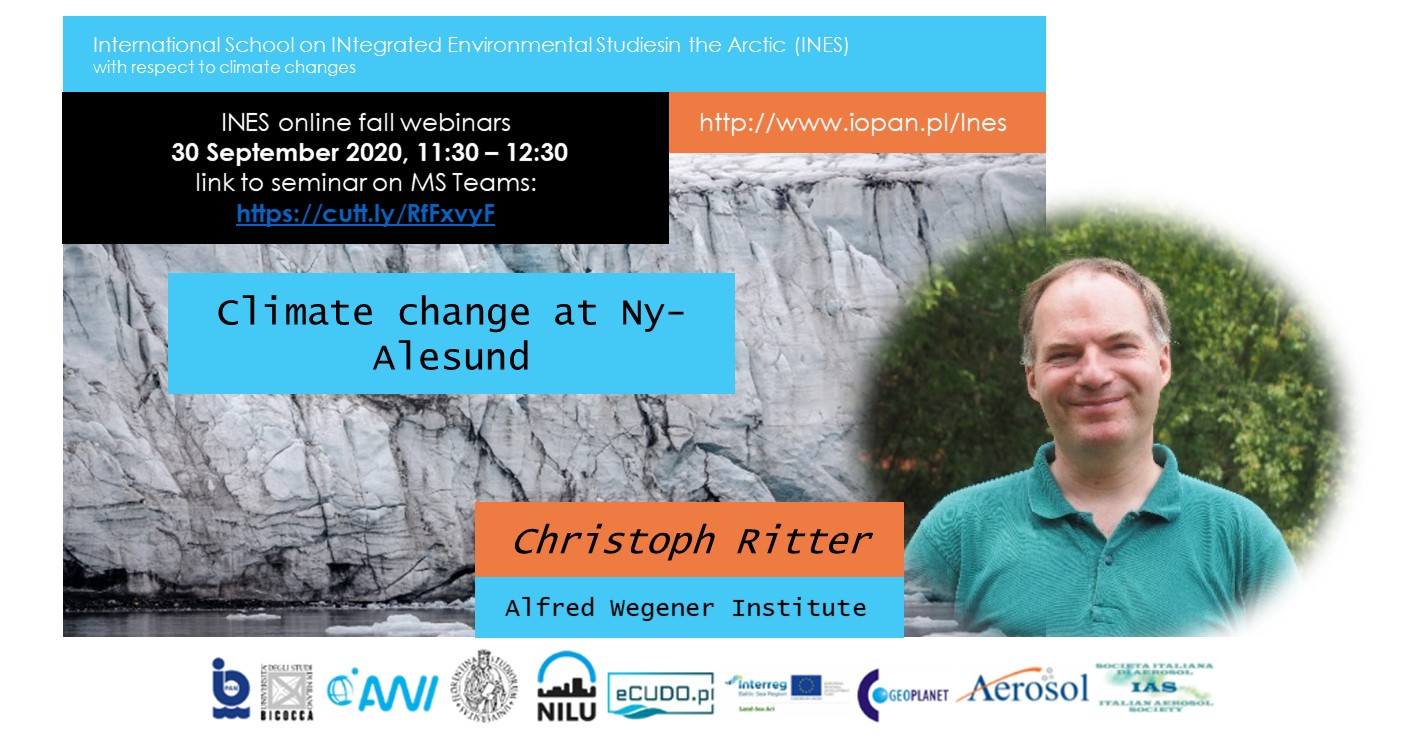 5. Why is Atlantic water important in the Arctic? - Its links to climate, sea ice, tidal glaciers and Arctic ecosystems by Agnieszka Beszczyńska-Möller; Institute of Oceanology PAN. https://cutt.ly/qfFxnTH
5. Why is Atlantic water important in the Arctic? - Its links to climate, sea ice, tidal glaciers and Arctic ecosystems by Agnieszka Beszczyńska-Möller; Institute of Oceanology PAN. https://cutt.ly/qfFxnTH
6. Climate change at Ny-Alesund by Christoph Ritter; Alfred Wegener Institute. https://cutt.ly/RfFxvyF
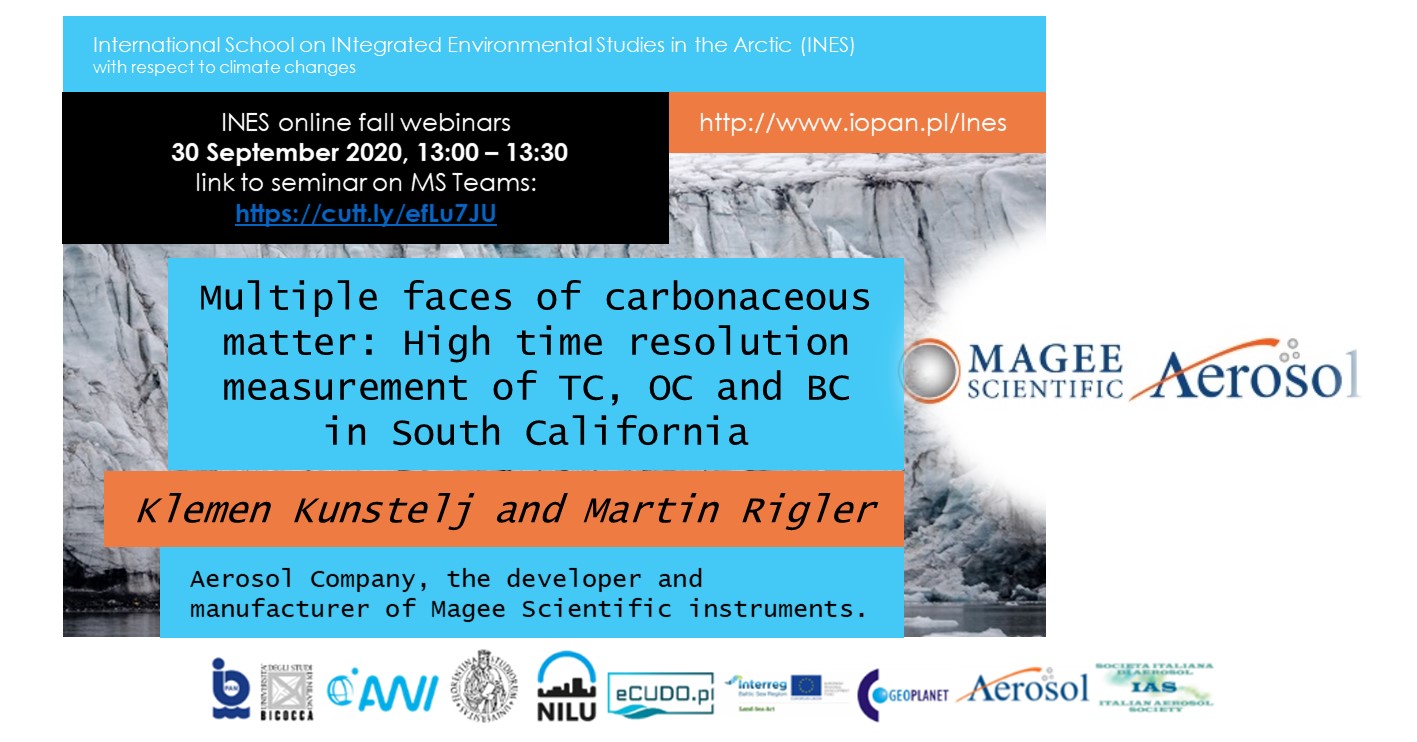 BONUS webinar: Multiple faces of carbonaceous matter: High time resolution measurement of TC, OC and BC in South California by Klemen Kunstelj and Martin Rigler; Aerosol Company, the developer and manufacturer of Magee Scientific instruments. https://cutt.ly/efLu7JU
BONUS webinar: Multiple faces of carbonaceous matter: High time resolution measurement of TC, OC and BC in South California by Klemen Kunstelj and Martin Rigler; Aerosol Company, the developer and manufacturer of Magee Scientific instruments. https://cutt.ly/efLu7JU
1 October 2020
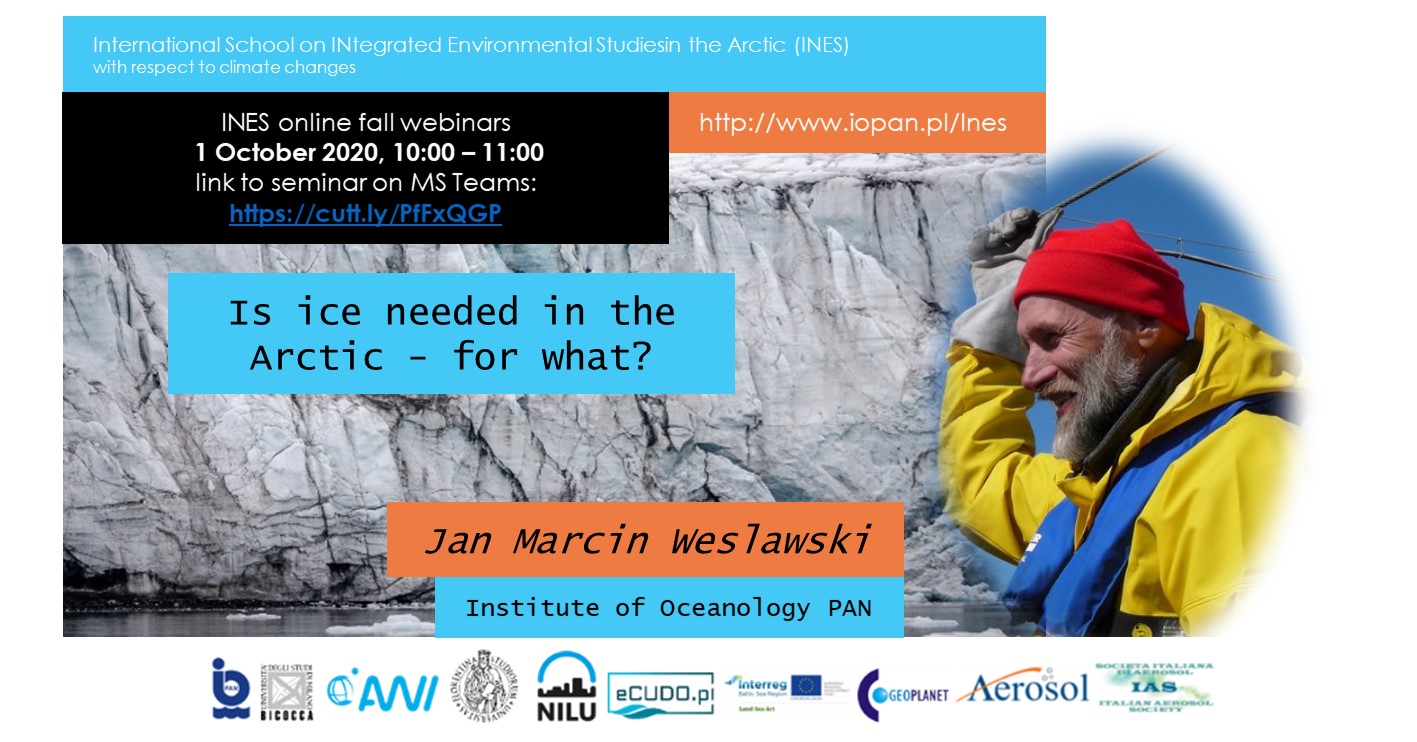
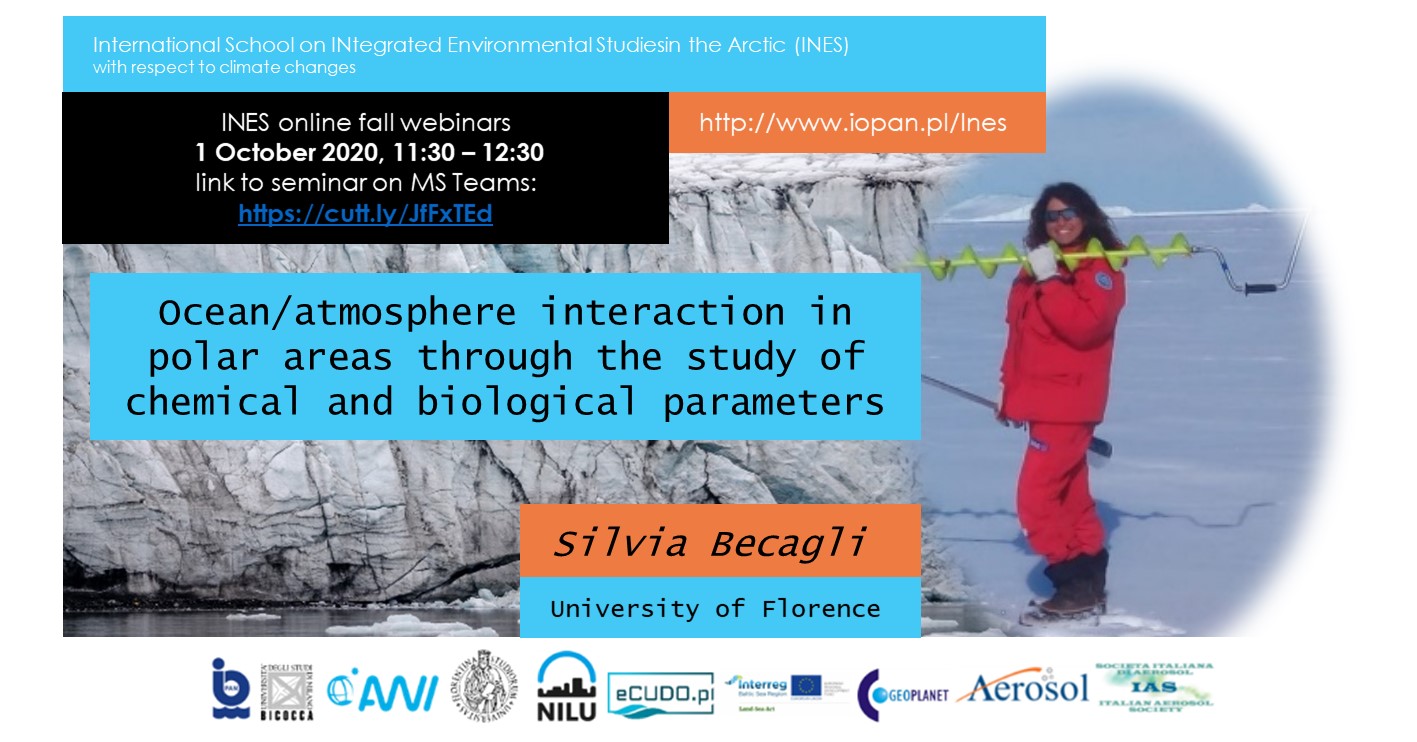 7. Is ice needed in the Arctic - for what? by Jan Marcin Węsławski; Institute of Oceanology PAN. https://cutt.ly/PfFxQGP
7. Is ice needed in the Arctic - for what? by Jan Marcin Węsławski; Institute of Oceanology PAN. https://cutt.ly/PfFxQGP
8. Ocean/atmosphere interaction in polar areas through the study of chemical and biological parameters by Silvia Becagli; University of Florence. https://cutt.ly/JfFxTEd
2 October 2020
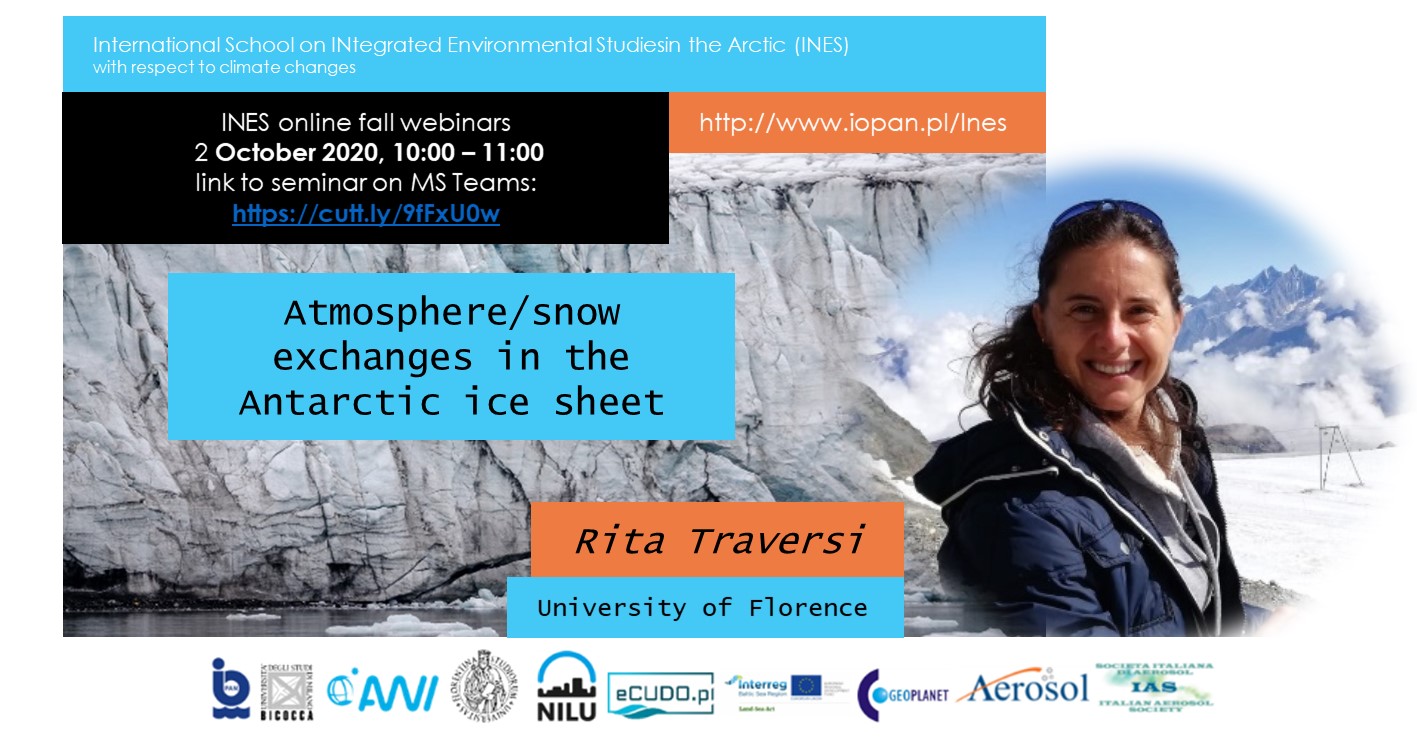
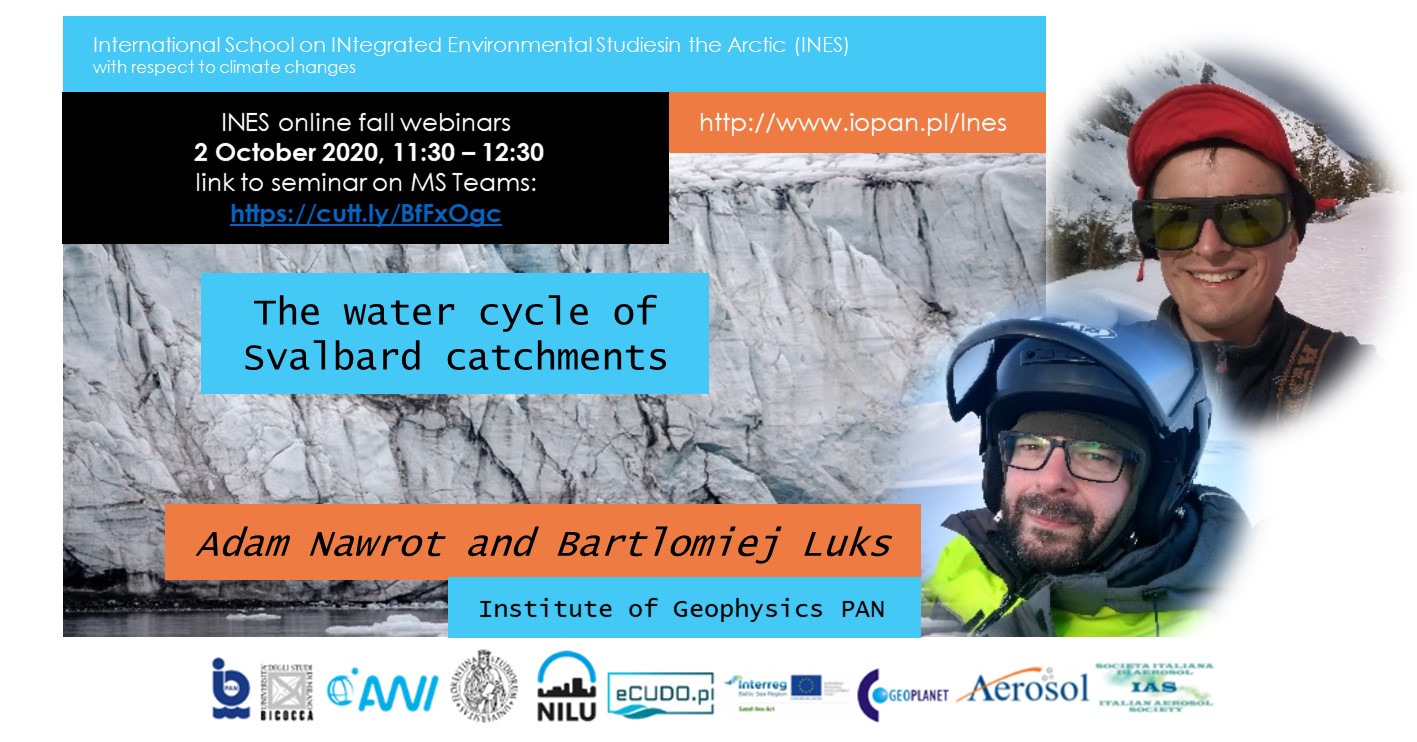 9. Atmosphere/snow exchanges in the Antarctic ice sheet by Rita Traversi; University of Florence. https://cutt.ly/9fFxU0w
9. Atmosphere/snow exchanges in the Antarctic ice sheet by Rita Traversi; University of Florence. https://cutt.ly/9fFxU0w
10. The water cycle of Svalbard catchments by Adam Nawrot and Bartlomiej Luks; Institute of Geophysics PAN. https://cutt.ly/BfFxOgc
Dates and times
All webinars will be held at the same times (CEST): 10:00 – 11:00 and 11:30 – 12:30 each day between 28 September and 2 October 2020.
BONUS webinar (7) will be held at 13:00-13.30 (CEST).
Each webinar lasts 60 minutes, i.e. 45 minutes plus 15 minutes for discussions.
Housekeeping rules
Webinars are open to the public, and all meetings will be recorded*. Only the web browser is needed to use a link, while webinars will be provided using MS Teams platform. Please ensure that your video is turned off and your microphone is muted during the seminar.
Please ask your questions or comments (short and specific) prior at a particular webinar by raise a hand. Each lecturer will discuss it during the webinar during the question time at the end of each webinar.
*By joining the webinar/s you agree to the content of the recording and sharing the recording via Internet.
Please use webinar links provided, following the particular webinar date and title. Link to the webinar will be provided at least one day before the set time on Institute of Oceanology Facebook page:
https://www.facebook.com/InstytutOceanologiiPAN,
on the school Facebook event:
https://www.facebook.com/events/329537071788989
and also on the school webpage:
http://www.iopan.pl/Ines.
During webinars, please use the Chrome browser
https://www.google.com/intl/pl_pl/chrome/.
If you will use the phone during the webinar, you must download the application:
https://www.microsoft.com/en-us/microsoft-365/microsoft-teams/download-app/.
If you are already a user of MS Teams and want to join the INES team on MS Teams please write your name, surname and email which you use to log in the MS Teams app to the pakszys@iopan.pl.
This initiative is a joint effort of the Institute of Oceanology Polish Academy of Sciences, University of Milano-Bicocca, Alfred Wegener Institute, University of Florence, Norwegian Institute for Air Research and Norwegian Polar Institute.
The School is co-sponsored by Aerosol d.o.o., Slovenia a developer and manufacturer of Aethalometer, Total Carbon Analyzer, DRI-2015 OC/EC Analyzer and associated instrumentation. Aerosol is focused to research and development in the field of carbonaceous aerosols. and project Elektroniczne Centrum Udostępniania Danych Oceanograficznych eCUDO.pl No POPC.02.03.01-00-0062/18-00, funded under Program Operacyjny Polska Cyfrowa, II oś priorytetowea E-administracja.



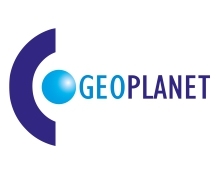




 BONUS webinar: Multiple faces of carbonaceous matter: High time resolution measurement of TC, OC and BC in South California by Klemen Kunstelj and Martin Rigler; Aerosol Company, the developer and manufacturer of Magee Scientific instruments. https://cutt.ly/efLu7JU
BONUS webinar: Multiple faces of carbonaceous matter: High time resolution measurement of TC, OC and BC in South California by Klemen Kunstelj and Martin Rigler; Aerosol Company, the developer and manufacturer of Magee Scientific instruments. https://cutt.ly/efLu7JU